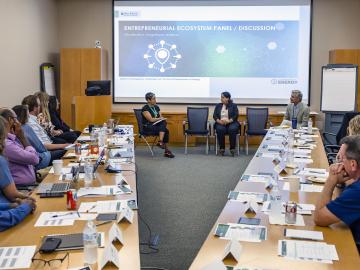
Filter News
Area of Research
News Topics
- (-) Biotechnology (39)
- (-) Coronavirus (48)
- (-) Summit (71)
- 3-D Printing/Advanced Manufacturing (146)
- Advanced Reactors (40)
- Artificial Intelligence (131)
- Big Data (79)
- Bioenergy (112)
- Biology (128)
- Biomedical (73)
- Buildings (74)
- Chemical Sciences (86)
- Clean Water (33)
- Composites (35)
- Computer Science (226)
- Critical Materials (29)
- Cybersecurity (35)
- Education (5)
- Element Discovery (1)
- Emergency (4)
- Energy Storage (114)
- Environment (218)
- Exascale Computing (67)
- Fossil Energy (8)
- Frontier (64)
- Fusion (66)
- Grid (74)
- High-Performance Computing (130)
- Hydropower (12)
- Irradiation (3)
- Isotopes (62)
- ITER (9)
- Machine Learning (68)
- Materials (157)
- Materials Science (158)
- Mathematics (12)
- Mercury (12)
- Microelectronics (4)
- Microscopy (56)
- Molten Salt (10)
- Nanotechnology (64)
- National Security (86)
- Neutron Science (171)
- Nuclear Energy (122)
- Partnerships (68)
- Physics (69)
- Polymers (35)
- Quantum Computing (53)
- Quantum Science (92)
- Security (31)
- Simulation (65)
- Software (1)
- Space Exploration (26)
- Statistics (4)
- Transportation (103)
Media Contacts

Using a best-of-nature approach developed by researchers working with the Center for Bioenergy Innovation at the Department of Energy’s Oak Ridge National Laboratory and Dartmouth University, startup company Terragia Biofuel is targeting commercial biofuels production that relies on renewable plant waste and consumes less energy. The technology can help meet the demand for billions of gallons of clean liquid fuels needed to reduce emissions from airplanes, ships and long-haul trucks.

Two-and-a-half years after breaking the exascale barrier, the Frontier supercomputer at the Department of Energy’s Oak Ridge National Laboratory continues to set new standards for its computing speed and performance.

A multi-institutional team of researchers led by the King Abdullah University of Science and Technology, or KAUST, Saudi Arabia, has been nominated for the Association for Computing Machinery’s 2024 Gordon Bell Prize for Climate Modelling.

To bridge the gap between experimental facilities and supercomputers, experts from SLAC National Accelerator Laboratory are teaming up with other DOE national laboratories to build a new data streaming pipeline. The pipeline will allow researchers to send their data to the nation’s leading computing centers for analysis in real time even as their experiments are taking place.

A new Global Biomass Resource Assessment developed by ORNL scientists gathered data from 55 countries resulting in a first-of-its kind compilation of current and future sustainable biomass supply estimates around the world.

The Oak Ridge Leadership Computing Facility welcomed users to an interactive meeting at the Department of Energy’s Oak Ridge National Laboratory from Sept. 10–11 for an opportunity to share achievements from the OLCF’s user programs and highlight requirements for the future.

The Summit supercomputer, once the world’s most powerful, is set to be decommissioned by the end of 2024 to make way for the next-generation supercomputer. Over the summer, crews began dismantling Summit’s Alpine storage system, shredding over 40,000 hard drives with the help of ShredPro Secure, a local East Tennessee business. This partnership not only reduced costs and sped up the process but also established a more efficient and secure method for decommissioning large-scale computing systems in the future.

A team led by scientists at ORNL identified and demonstrated a method to process a plant-based material called nanocellulose that reduced energy needs by a whopping 21%, using simulations on the lab’s supercomputers and follow-on analysis.

Five researchers at the Department of Energy’s Oak Ridge National Laboratory recently completed an eight-week pilot commercialization coaching program as part of Safari, a program funded by DOE’s Office of Technology Transitions, or OTT, Practices to Accelerate the Commercialization of Technologies, or PACT.

The world’s fastest supercomputer helped researchers simulate synthesizing a material harder and tougher than a diamond — or any other substance on Earth. The study used Frontier to predict the likeliest strategy to synthesize such a material, thought to exist so far only within the interiors of giant exoplanets, or planets beyond our solar system.


